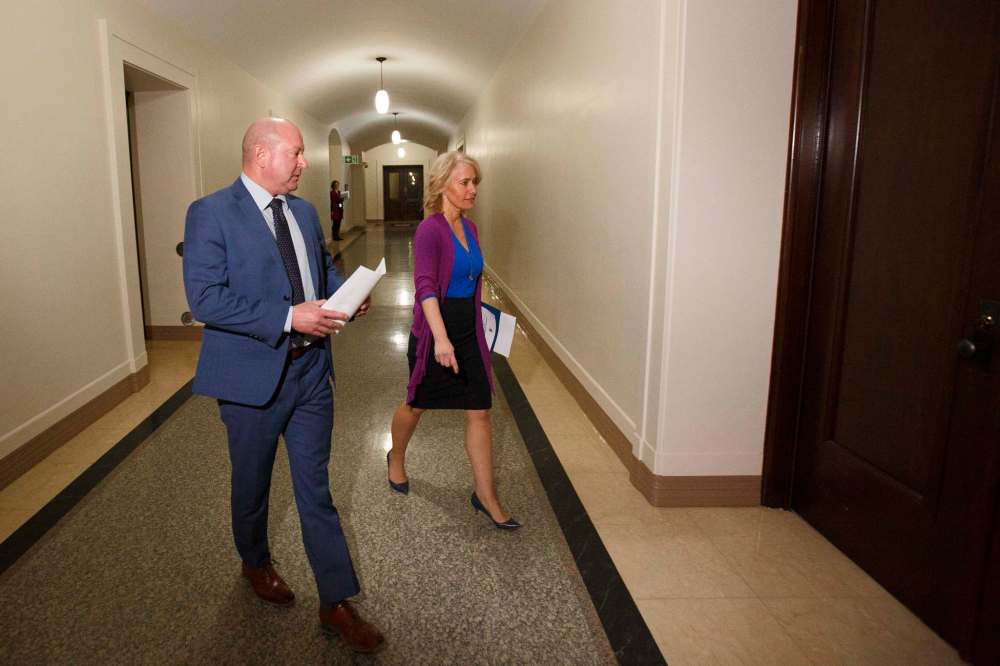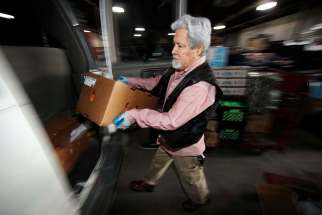Pallister vows ‘appropriate actions at the appropriate time,’ in virus battle, but details in short supply
Read this article for free:
or
Already have an account? Log in here »
To continue reading, please subscribe:
Monthly Digital Subscription
$1 per week for 24 weeks*
- Enjoy unlimited reading on winnipegfreepress.com
- Read the E-Edition, our digital replica newspaper
- Access News Break, our award-winning app
- Play interactive puzzles
*Billed as $4 plus GST every four weeks. Offer only available to new and qualified returning subscribers. Cancel any time.
Read unlimited articles for free today:
or
Already have an account? Log in here »
Hey there, time traveller!
This article was published 23/03/2020 (1775 days ago), so information in it may no longer be current.
Manitoba has no plans to shut down all but essential commerce, unlike some other provinces, at least for now.
“We are going to take appropriate actions at the appropriate time,” Premier Brian Pallister said Monday during a teleconference announcing a new online tool for Manitobans to help each other during the COVID-19 pandemic.
“This is more of a marathon than a sprint,” he said, referring to the challenges facing Manitobans in the weeks and months ahead.
Right now, the focus is on how to “flatten the curve” through social distancing, so Manitoba’s health-care system doesn’t get slammed by more critically ill patients than it can handle, Pallister said.
All Manitobans, including health-care providers, are being advised to cancel or postpone unnecessary out-of-province and out-of-country travel.
“Now is not the time for non-essential travel,” chief provincial public health officer Dr. Brent Roussin said at his daily briefing.
New online tool
The province has teamed up with the private sector to develop an online tool that connects volunteers with those who need help during the COVID-19 pandemic.
Premier Brian Pallister said those requiring assistance anywhere in Manitoba can use the web-based application, www.HelpNextDoorMB.ca, which went live on Monday.
The online site is designed to safely match volunteers with such needs as grocery and medication deliveries, snow-clearing and other necessities.
The provincewide online platform was designed and developed by North Forge Technology Exchange, a non-profit Winnipeg technology organization, with the help of software industry partners.
“We’re talking about assisting vulnerable people and getting services that they need, help that they need,” Pallister told a news conference.
“It could be a person living with a disability or recovering from an injury. It could be a vulnerable senior looking for help in getting groceries,” he said.
Jerin Valel, the province’s director of technology and transformation, said the online tool will be moderated and monitored by a group of volunteers led by North Forge.
Depending on the circumstances, volunteers may be pre-cleared through background checks — criminal as well as child abuse registry checks — to ensure the safety of those being assisted, he said.
Valel said the online service can be accessed through mobile phones, tablets or desk top computers.
Those who are already volunteering during the coronavirus emergency can use the application to continue to do good deeds, he said, adding that volunteers will be asked to adhere to recommended social distancing protocols.
He said someone who lives outside Manitoba will be able to use the online tool to ask a volunteer to check on a loved one here.
Meanwhile, in answer to media questions, Pallister said the online service might also come in handy in the case of a big Red River flood.
Provincial flood forecasters are scheduled to update Manitobans on the flood threat in the coming days.
“Based on the projections, our flood likelihood is greatly reduced from what we might have thought some weeks ago,” the premier said Monday.
Pallister said fighting a flood could present challenges to those who wish to fill sandbags while observing social distancing rules.
— Larry Kusch
“This is not just a suggestion. The Public Health Act allows us to issue orders.”
Anyone who returns from travel, international or domestic, needs to self-isolate and self-monitor for symptoms for 14 days, he said.
That does not include individuals involved in the commercial transportation of goods and services, or employees who live in a neighbouring jurisdiction and travel to Manitoba for work; or normal personal travel between border communities, which includes visits to a cottage.
As of Monday, all 20 reported cases of COVID-19 in Manitoba are travel-related, Roussin said. Fourteen of the cases have been lab-confirmed, with six probable positives.
There are no COVID-19 patients being treated in Manitoba hospitals; the only individual who was in hospital has been discharged.
Roussin said the latest probable positive case is a man in his 50s who lives in Winnipeg. Another case initially identified as probable has been ruled out. That involves a false positive test in which health officials were tracing the person’s contacts to determine if it was travel-related. The test was not confirmed positive by the National Microbiology Laboratory, so it was sent for re-testing at Cadham Provincial Laboratory, the provincial testing facility, and came back negative.

Health officials are trying to prevent the spread of the virus while dealing with a testing backlog at Cadham, Roussin said.
“They’ve been certainly prioritizing certain groups of tests, those of health care workers, those who are critically ill, those in hospital, as well as those who are from a long-term care facility and First Nations. Those are being prioritized.”
Cadham, along with labs around the world, are struggling to source the required “reagent,” the COVID-19 testing material that extracts viral RNA (ribonucleic acid) from the nose swab samples. Those reagents are in short supply. The province is investigating ways to expand its capacity.
“This is not just a suggestion. The Public Health Act allows us to issue orders.”
– Chief provincial public health officer Dr. Brent Roussin
“Right now the major roadblock is the reagent — and that is worldwide, in all jurisdictions,” Roussin said. Cadham lab is working on producing its own, “which is why they’re now getting out of this backlog and getting up to full capacity this week.”
Roussin couldn’t say how many COVID-19 tests were processed at the lab Sunday but that 4,300 had been done to date, with 20 positives, which is “remarkably low,” he said.
On Sunday, 436 people visited the 11 COVID-19 screening sites across the province, and there have been 4,100 visits since the first sites opened March 12. The sites require referrals from Health Links, which received 2,400 calls Sunday with a 33-minute average wait, Lanette Siragusa, Shared Health chief of nursing said Monday. The wait time has fallen from almost two hours last week.
Demand for intensive-care unit beds has lessened, she said. There are 131 medicine beds in Winnipeg open right now and intensive-care unit capacity is just under 80 per cent, said Siragusa. “We don’t see those numbers very often.”
In an effort to prevent the spread of the virus in the community, in-home health-care providers are contacting clients to complete screening in advance of normal appointments over the phone or from an appropriate social distance before entry to the home. Screening is intended to identify whether services may safely be postponed or offered in another way, such as over the phone.
Pallister said more closures — and extending school closures — may be coming. And the order to reduce gatherings to fewer than 50 people could be adjusted downward.
“The work we do now, and have undertaken previously, is starting to show we’re getting a handle of the number of new cases, but we’re not out of the woods.”
– Premier Brian Pallister
“We’ll have more to say on that tomorrow or the day after,” he said, noting he’s still not aware of any violation of the gathering-size order being reported to public health officials.
When asked about what will happen to laid-off Manitoba tenants who can’t afford rent at the end of the month, Pallister said it is “a key concern” and “we’ll have more to say on this and several other issues in the not-too-distant future.”
The province is trying “to anticipate the needs of people going forward… and trying to make sure we have the services available when people need them,” he said.
“Almost every single industry is going to see consequences as a result of the pandemic,” he said, while calling Manitoba the “home of hope.”
Manitoba has a healthy, diverse economy to help it weather the COVD-19 storm better than other provinces, he said, adding Manitoba is “reaping the benefits” of its early efforts to prepare for the virus.
“The work we do now, and have undertaken previously, is starting to show we’re getting a handle of the number of new cases, but we’re not out of the woods,” he said.
carol.sanders@freepress.mb.ca
larry.kusch@freepress.mb.ca

Carol Sanders
Legislature reporter
After 20 years of reporting on the growing diversity of people calling Manitoba home, Carol moved to the legislature bureau in early 2020.

Larry Kusch
Legislature reporter
Larry Kusch didn’t know what he wanted to do with his life until he attended a high school newspaper editor’s workshop in Regina in the summer of 1969 and listened to a university student speak glowingly about the journalism program at Carleton University in Ottawa.
Our newsroom depends on a growing audience of readers to power our journalism. If you are not a paid reader, please consider becoming a subscriber.
Our newsroom depends on its audience of readers to power our journalism. Thank you for your support.
History
Updated on Monday, March 23, 2020 2:09 PM CDT: Updated.
Updated on Monday, March 23, 2020 6:17 PM CDT: FInal version
Updated on Monday, March 23, 2020 6:33 PM CDT: Adds photos
Updated on Monday, March 23, 2020 6:38 PM CDT: embeds video








